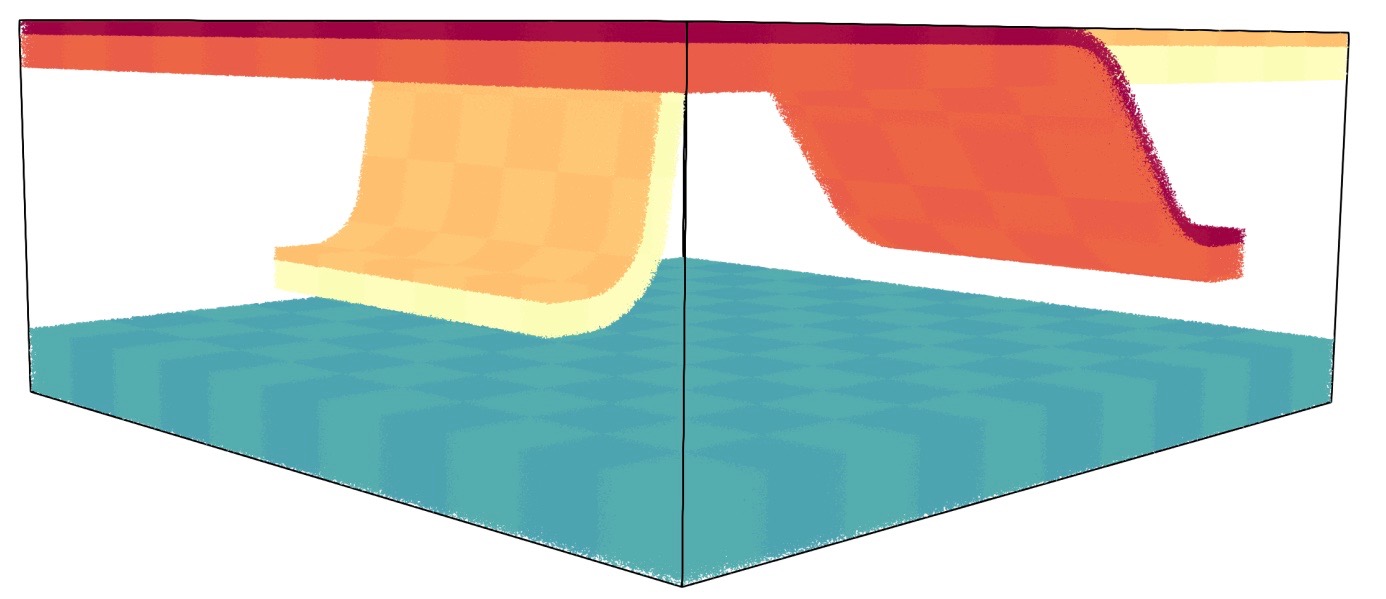 |
| August 2019 Volume 8 Issue 3 |

Setting up initial conditions for geodynamic systems in computational modeling codes vary in difficulty. Models which are geometrically very simple are easy to make with the help of a few if and else statements in a code or perhaps through a function parser. Similarly, very realistic present day instantaneous models using data from, for example, seismic tomography can also be straight forward to construct once a relationship between the seismic anomaly and temperature has been developed. However, a problem arises when constructing a realistic evolutionary model starting in the geologic past. Using a function parser approach for this kind of problem results in extremely long and complicated sets of equation which are not easy to construct and very hard to modify. The Geodynamic World Builder (GWB) is designed to address these problems by allowing users to construct complex models that are easily modified and shared, thereby promoting reproducibility and open science. ... [full article]
geodynamicworldbuilder.github.io
Contributed by Menno Fraters [doi.org/10.5194/se2019-24]
As CIG III enters Year 4 (out of 5), the Executive Committee is seeking your feedback as the community transitions to CIG IV. CIG has been forward looking in many of its past initiatives arising from members of our community. Please let us know what activities you value, how you wish to contribute, and how we may reimagine ourselves to continue as leaders in the computational geodynamics community by participating in the survey (link below). Survey closes August 15. [link]
Nominations are now open for this year's elections - 2 seats are open on the Executive Committee and 2 on the Science Steering Committee. Many thanks to EC members Claire Currie and Frederik Simons, and SSC members Brad Aagard and John Rudge for their contributions to the community. Email the Nominations Committee your nominations for these key governance positions as we plan the transition to CIG IV. [email]
The 2019 CIG Annual Report is available for download from our website. [pdf]
Participants at the 6th annual ASPECT Hackathon held in Heber, Utah in May enjoyed the rain, hail, snow, and grazing deer while contributing to code development. The 24 predominantly early career participants quickly organized and began work initiating and implementing major projects for the thermal convection code ASPECT including merging a new GMG preconditioner for the Stokes solver, initiating the implementation of code testing coverage, adding new benchmarks, and the refactoring of material models among many other projects. Thanks to the Principal Developers Wolfgang Bangerth (CSU Fort Collins), Juliane Dannberg (UC Davis), Menno Fraters (UC Davis), Rene Gassmöller (UC Davis), Anne Glerum (GFZ Potsdam), Timo Heister (U. Utah), and John Naliboff (UC Davis) for mentoring others and their hard work reviewing pull requests during the event.
Tutorials, science talks, and discussions brought 58 researchers together at the Colorado School of Mines this June. This popular workshop series begun in 2002 alternates between in person and virtual leveraging the extensive written documentation and on-demand videos to help participants prepare. The predominantly early career participants showed strong interest in numerical modeling with interest in contributing to development of the code itself. Thanks to SCEC for partnering with us to provide support for a third of the participants and Brad Aagard (USGS), Matt Knepley (U. Buffalo), and Charles Williams (GNS Science) for leading this workshop. [report]
The second Rayleigh Hackathon held at CU Boulder in July made significant progress in code development. The 15 early career to senior researchers participants worked steadily through the week to improve, enable, and create online documentation, code checkpointing, and to custom reference states for the dynamo code Rayleigh. The group totaled 160 commits over the week tripling previous efforts. Thanks to Lead Developer Nick Featherstone (CU Boulder) for hosting this event and Rene Rene Gassmöller (UC Davis) for encouraging participants to become reviewers and approve pull requests.

Pylith v2.2.2 2 July 2019